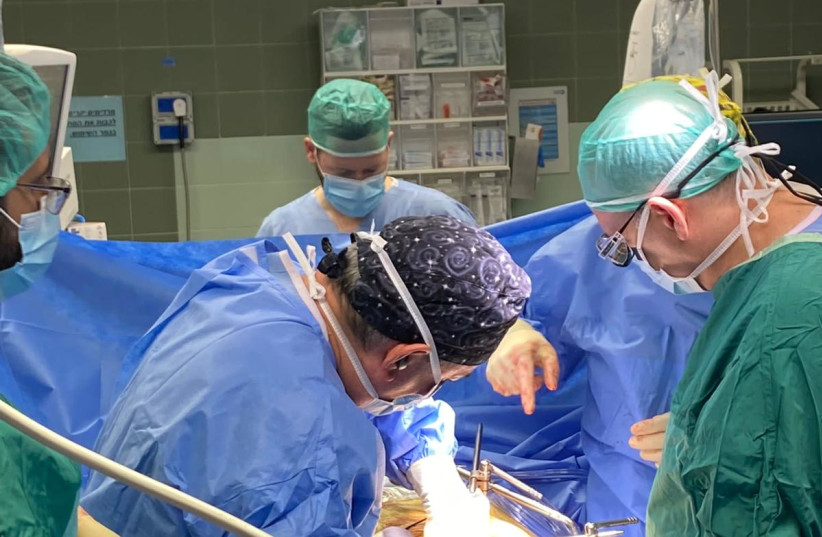A 65-year-old woman named Leah Biton who suffered an unusual fracture in her spine and was unable to get around is now able to walk without pain just two days after a Shaare Zedek Medical Center (SZMC) team in Jerusalem carried out innovative surgery for the first time in Israel.
The groundbreaking technology with a minimally invasive surgical approach was applied for the first time at the Jerusalem hospital to repair a spinal fracture through the abdominal cavity.
In the innovative robotic surgery, screws are used that go through them autonomously after planning in advance for the exact position in the spine through the abdominal cavity, thus saving the patients a difficult and complex surgery.
Innovative surgery at Jerusalem's Shaare Zedek Medical Center
It happened last week while the woman, who lives in Ma'ale Adumim, was cleaning the floor in her apartment, slipped and fell on her wrist. As a result of the fall, she felt intense pain in her hand and in all parts of her body and turned to the emergency medical center of Terem for a response.
An examination that was performed showed a fracture in the wrist and the hand was cast. Biton said she didn’t notice at all that the intense pain she felt in her whole body was the result of an unusual fracture in the spine that was not detected due to the sharp pain in her hand. It made her disabled.

Dr. Cesar Mizrahi, a SZMC neurosurgeon and spine surgery specialist who immigrated from Brazil, has performed dozens of such operations in Melbourne, Australia, in recent years. In light of the success of the cases in Australia and around the world, the method was brought to Israel for the first time together with his extensive experience in these surgeries. The surgery was an effort in a multidisciplinary collaboration together with a bariatric specialist, Dr. Ram Shapira, director of the hospital’s bariatric surgery unit, and spine specialist, Dr. Yair Barzilay, director of the spine surgery unit.
“The pain in my hand was so intense, I didn't even think that I had also injured my spine until I suddenly felt that I was no longer able to stand and move around. As time passed, the pain intensified. I decided to check the pain relief. I was referred to Dr. Mizrahi, who was very thorough and asked me to undergo a series of tests that discovered a severe fracture in the spine near the lower back. When I was told that it was a fracture, I was surprised and very afraid of losing my independence. For 30 years, I worked with the elderly and assisted in their ongoing care, and suddenly I became in need of assistance myself,” Biton said.
At the end of a meticulous planning procedure in collaboration with the imaging specialists, the surgery was performed with a minimally invasive anterior approach. It began with a tiny incision of a few millimeters in the abdomen, performed by Shapira and continued with the nerve release and anterior fixation by Mizrahi and Barzilay. They were assisted by the Mazor Company’s robot – one of the most innovative systems available in the world today – that allows the exact location of the entire fixation system to be located.
“We opened a tiny opening through a minimally invasive approach through the abdominal wall, without entering the abdominal cavity of course. The great advantage of this approach is the direct passage to the vertebral body without exposure to the nerves at all. Our extensive experience in bariatric surgery allowed us to take the most convenient approach without any damage to the nearby organs, leading to a better recovery with almost no pain,” Shapira added.
“Working in the narrow space of the tiny opening requires great skill since the arteries and veins of the abdominal cavity and spinal nerves are exposed and we surgeons have little maneuverability.”
Caesar Mizrahi
“Working in the narrow space of the tiny opening requires great skill since the arteries and veins of the abdominal cavity and spinal nerves are exposed and we surgeons have little maneuverability,” said Mizrahi.
“The state-of-the-art robotically guided instrumentation using a first-of-its-kind fixation system in Israel that supports the spine at 360 degrees, saves cuts in the muscles and enables a faster and more accurate fusion without pain. Small incision surgeries allow optimal results without injuring the muscles and replaces invasive and painful surgeries that take over a month to recover from them. A number of studies have already examined the issue that compares the data related to success and recovery time between minimally invasive surgeries and ‘open’ surgeries with a significant advantage to a minimally invasive approach. In addition, fixation of a spine under the use of a robot is clearly more accurate compared to traditional methods. I am proud to be among the pioneers in the most innovative approaches that improve the quality of life of our patients.”
